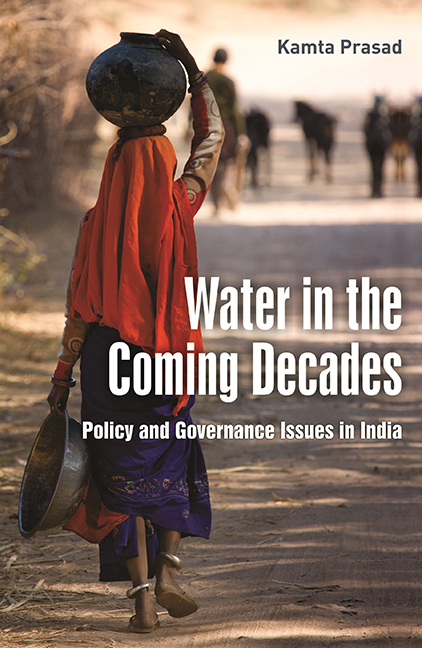Book contents
- Frontmatter
- Dedication
- Contents
- List of Tables
- List of Abbreviations
- Preface
- Acknowledgements
- Section I Overall Perspectives
- Section II Situational Analysis
- Section III Socio-economic, Institutional and Environmental Aspects
- Section IV Technological Options
- Section V Concluding Observations
- References
- Index
23 - Watershed Development and Rain Water Harvesting
Published online by Cambridge University Press: 13 July 2022
- Frontmatter
- Dedication
- Contents
- List of Tables
- List of Abbreviations
- Preface
- Acknowledgements
- Section I Overall Perspectives
- Section II Situational Analysis
- Section III Socio-economic, Institutional and Environmental Aspects
- Section IV Technological Options
- Section V Concluding Observations
- References
- Index
Summary
The need for promoting additional sources of water supply has led to emphasis on watershed development and rain water harvesting (RWH). Some analysts go to the extent of considering these sources as alternatives to dams and canals. This chapter investigates their need, gives a brief account of government policies and programmes for their growth, highlights the role of non-governmental agencies, analyses experience and provides an overall assessment.
Need
Demand for water has been on an upward swing for the past few decades and is likely to be so on account of reasons explained in Chapter 4. On the contrary, the traditional sources of water supply such as canals and groundwater are reaching saturation points. Expansion of canals is hampered by opposition to large dams by a vocal group of activists and inadequacy of suitable sites among others, while the development of groundwater in water-scarce areas is constrained by over-exploitation and continuous fall in the water table. At the same time, areas deprived of irrigation, like those in the uplands or suffering from droughts, have been clamouring for it. About 70 per cent of agricultural land in India comes under the category of rain-fed cultivation. Raising agricultural productivity in such areas is considered necessary for food security and help in poverty alleviation. In some areas, adequate availability of drinking water also becomes a problem. It is in this context that there is an increasing emphasis on augmenting supply of water through local water harvesting (LWH) like watershed development and RWH. By enriching moisture regime in the soil, watershed development programmes also help in pasture development and growth of plantation. This leads to increase in fodder and fuel apart from that in agricultural production. Improved livestock development, therefore, becomes another major outcome. Watershed development has, thus, both economic and ecological benefits. LWH also leads to augmentation of groundwater, the potential of which for providing irrigation and drinking water increases. This benefit is found so important that the Government of India has launched a scheme for recharge of groundwater through LWH. India's future food security, even from its so-called green revolution areas, will depend heavily on a nationwide groundwater recharge programme through RWH.
- Type
- Chapter
- Information
- Publisher: Foundation BooksPrint publication year: 2014



